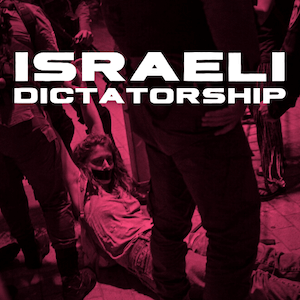
In the “Israeli Dictatorship” series, I have been reporting on how the little space that existed for Palestinian political expression in the areas held by Israel since 1948 has been crushed since October 7. One of the most chilling examples of this has been the use of administrative detention.
Administrative detention is an Israeli practice of holding Palestinian detainees without charge or trial. The longest period for a single administrative detention decree is six months, but there is no limit on the number of times that the same person may be detained, in continuity or with some breaks. For this reason, administrative detention is regarded as indefinite detention.
Although more associated with the Israeli occupation’s regime in the West Bank, administrative detention is used in ‘48 Palestine as well, and since October 7, it has been an important way Israel has repressed and terrorized Palestinians.
Administrative detention: a tool of occupation
Administrative detentions have always been part of Israel’s repressive measures against Palestinians. Beginning in 1948, Israel used an administrative detention policy inherited from the British occupation of Palestine (the so-called “Mandate”). In 1979, Israel’s Knesset approved its own “Emergency Powers (Detentions) Law” governing the draconian use of administrative detention. The law only applies during a “state of emergency,” which is meant to be temporary. But, since 1948, the Knesset has always renewed what became a permanent “state of emergency.”
According to this law, administrative detention of Israeli citizens should be presented for approval by the president of the District Court within 48 hours. In the West Bank an administrative detention has to be reviewed within eight days by a military judge. In the West Bank, there have always been hundreds of Palestinians held under administrative detention, but last year the numbers surged. According to Wikipedia (in Hebrew) there were 967 Palestinian administrative detainees in March 2023, and as of September 2023, before the events of October 7, that number had already grown to 1,264, which would be more than during the tensest period of the Second Intifada. According to a report by Baker Zoabi (in Siha Mekomit), out of some 4,600 Palestinians who were detained in the West Bank since October 7, about 2,800 are administrative detainees – an unprecedented number.
In 48 Palestine, as Israel tried to keep some democratic façade, the usage of administrative detention has historically been more restrained. The biggest wave of administrative detentions in 48 Palestine that I remember happened during the First Intifada. The intifada started on December 9, 1987, and after hundreds of unarmed Palestinian demonstrators were shot dead by the occupation army, the leadership of the 48 Palestinians called for a general strike on December 21, in what they called “the day of peace.” They requested the public not to demonstrate on that day to avoid any provocation from the police. Abna al-Balad, a radical leftist Palestinian grassroots movement challenging the community’s traditional leadership, named it “Palestine Day” and called on people to demonstrate in every town and village. In many places, people chose to actively express their anger at the ongoing massacres, and clashes erupted in several areas. Following those events, some ten of the leaders of Abna al-Balad were imprisoned under administrative decrees in the first half of 1988.
Later, administrative detention was used mostly for individual cases, some of which I reported in my Free Haifa blog (for example, here and here). After the mass uprising of May 2021, what we call “Hebat al-Karameh,” Israel issued several administrative detention orders in 1948 Palestine. One of them, Zafer Jabarin, a devoted Muslim who prays too much (for the Shabak’s taste) in Al-Aqsa, was in administrative detention again this year for four months but was released before the war began.
Administrative detention since October 7: The case of Majd Zgheir
Since October 7, no serious attempts to protest the war or show active solidarity with the people of Gaza have taken place since the initial attempts were squashed. The only consolation is that everybody is now acutely aware that we live under one occupation dictatorship, from the river to the sea. People do not dare to share their views on social networks, but Al-Jazeera and Al-Mayadeen are broadcasting live from Gaza into almost every home. People everywhere are discussing the situation, and most agree that Israel’s murderous onslaught is a sign of weakness, not strength.
One thing that has not changed since October 7 is the fact that the Shabak is the ultimate ruler over 1948 Palestinians. Everybody has “a file,” and the Shabak regularly invites people from all walks of life for “conversations.” Political activists, and not only them, sometimes find themselves subject to intense interrogations.
Being subject to Shabak interrogation means you can find yourself, without prior notice, in the dreadful filthy underground dungeons in Jelemeh detention center southeast of Haifa (or in some compatible institution in Al-Quds or Petah Tikva), devoid of any connection to the outside world, including no legal advice, and interrogated over endless hours without sleep or rest. Such “special interrogation” typically lasts about three weeks.
Most Palestinian protests in Haifa over the past eleven years were organized by Herak Haifa. Through these years, about a dozen Herak Haifa activists were subjected to intensive Shabak interrogations. All came out after this horrible experience without any charges. But it is a very powerful deterrent against deciding to be an activist in the first place.
So, it was not a big surprise when I learned that Majd Zgheir, a 25-year-old activist from Majd al-Krum (in the Galilee), was taken to Shabak interrogation on November 18. I have known Majd since 2016 when we held a poetry night in solidarity with detained poet Dareen Tatour. The shy Majd, then a high school student, came forward and offered to read from his own poems.
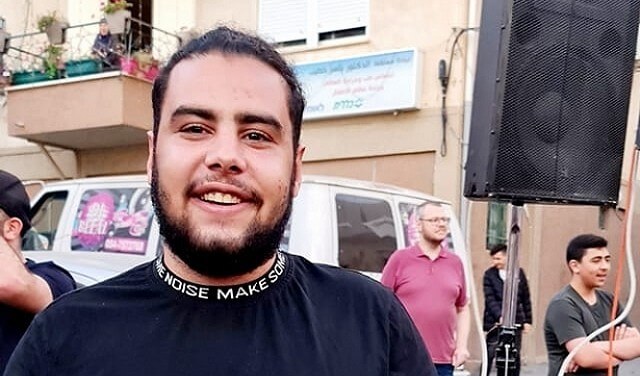
A year or two later, Majd had already endured a Shabak interrogation. Somebody broke the window of a parking police car in Majd al-Krum. The Shabak wanted revenge and arrested two local activists. But the Shabak is not supposed to interrogate people for a broken window, so they interrogated them about a terrorist plot and possession of arms. As there was no plot and no arms, they were released at the end of the interrogation without any charges.
The remand hearings for Majd, then and now, while under Shabak interrogation, were held in the Nazareth court. Since October 7, due to a special government decree, “security prisoners” are not brought to court, but are presented by a video chat instead. But, as Majd was prevented from meeting his lawyer, the choreography of the hearing was somewhat complicated. Before Majd appeared on the video screen, his lawyer, Hussein Mana’a, had to exit the courtroom so they would not even see each other. When the Shabak presented “secret evidence” to the judge, the lawyer had to exit the courtroom again. Even when the lawyer was allowed in, the hearing was still held behind closed doors, and even Majd’s parents were not allowed in. The Shabak claimed that there were serious “security” accusations against Majd, but I was sure that his new interrogation would end with his prompt release.
On December 7, we were in the Nazareth court, waiting for another remand hearing for Majd. Time went by, and the hearing was delayed. Suddenly, lawyer Mana’a told us that there was not going to be any hearing. He was informed that Israel’s war minister, Yoav Gallant, issued an administrative detention decree against Majd Zgheir, ordering his detention without indictment and without trial for six months.
Learning of unknown cases
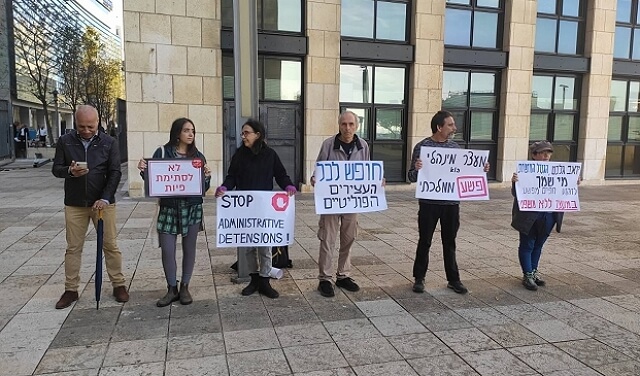
A review of Majd Zgheir’s administrative detention was scheduled for Sunday morning, December 10, before Judge Ron Shapira, the president of the Haifa District Court. On Sunday morning, we held a small vigil in front of the Haifa court, protesting administrative detentions. Maybe because there were just seven of us, maybe because it was not about the war in Gaza, the police did not prevent the vigil.
The hearing itself was behind closed doors, as is the practice for all administrative detentions. I noticed that the hearing procedures were streamlined. In most courts, the prosecutor brings the evidence first so that the defense can object and try to contradict them later. In this hearing, as the defense lawyer is not allowed to see the state’s evidence anyway, the judge heard lawyer Mana’a first and then held his intimate closed session with the Shabak people. He let us go home early, saying he would announce his decision on Tuesday. We did not hold our breath.
When we came to hear the judge’s decision on Majd’s administrative detention, or, rather, waited behind closed doors as the lawyer heard the decision, we were surprised to learn that there was a second administrative detention order being considered that same day. Jaber Mahajnah, from Umm al-Fahm, was detained on December 5 by the Shabak. After a relatively short interrogation spanning less than a week, he was transferred to administrative detention for a period of three months.
We were allowed into the courtroom before Judge Shapira came in and were lucky to see Jaber Mahajnah appearing on video from the Jelemeh detention center. As the judge came in, I stayed seated in the courtroom. Before the judge noticed me and ordered me to leave, I had the opportunity to hear Jaber’s lawyer, Raslan Mahajnah, asking where the Shabak representative was. The judge pretended that he did not know what the lawyer was talking about. The lawyer explained that in the hearings for approval of administrative detention in Jerusalem, Shabak representatives appear in the courtroom behind a screen, so that the defense lawyer could at least ask them some questions about the justification for the decree. The judge in Haifa had nothing of it.
We waited outside the courtroom for the lawyer to try to understand the story behind Mr. Mahajnah’s detention. We learned that he dedicates much of his time to studying Islamic holy scriptures and used to publish his interpretations of them on Instagram. He did not write anything about current affairs, so he could not be charged for his posts. Instead of using distorted translations and out-of-context interpretations, the type of tactics the police regularly use to land many other Palestinians in prison for social media posts, the Shabak simply preferred to hand him administrative detention. When I talked about Mahajnah’s case with another lawyer who defends administrative detainees, she said it was clear that they had nothing against him. Otherwise, they would not be satisfied with his detention for “only” three months.
Administrative detention as a tool to terrorize the public
I started investigating how many Palestinians in ’48 are currently subject to administrative detention and under what circumstances. It was hard to find an answer. Based on conversations with more than ten lawyers and human rights organizations, I arrived at a list of six detainees. Three of them, two from Arraba and one from Sakhnin were arrested by the Shabak on October 29. On November 11, all three were transferred to administrative detention for six months. They are represented by Human Rights lawyer Sawsan Zaher.
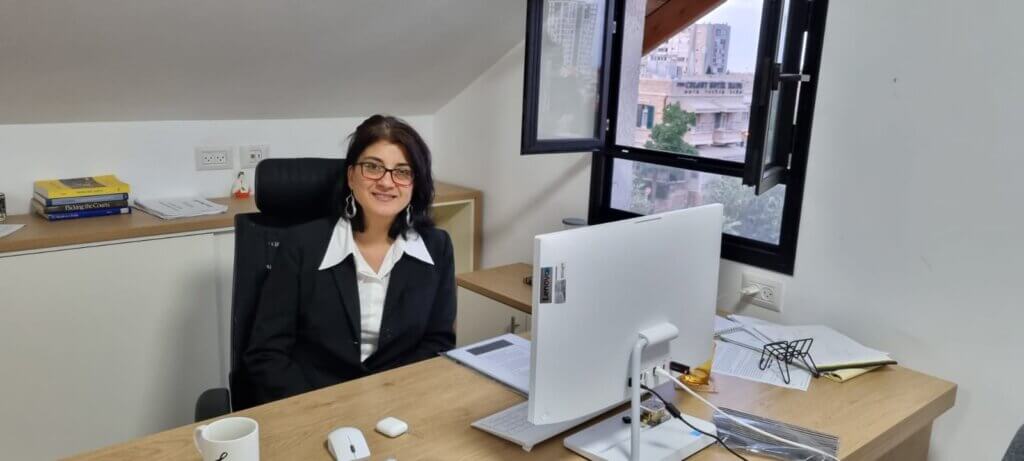
On November 19, Judge Shapira issued a censored version, that is allowed to be published, of his decision to approve the detention of one of lawyer Zaher’s clients. The name of the detainee himself is still secret, but the arguments justifying the detention are revealing. They state that:
“Administrative detention is fundamentally preventive and not punitive. It is intended to prevent anticipated activity prohibited by law, and it is not intended to punish acts that have already been committed… The reference to ‘state security’ in the emergency powers law is wide enough to include situations in which the danger to the security of the state and/or the public is not due to the detainee himself, but to the action of others, which may be influenced by that person’s arrest… As far as the dangerousness (Editor’s note: “Dangerousness” is used as a cause for detention) is concerned – it should be made clear that it is not solely focused on the individual person, but also depends on the surrounding reality… The state of emergency and the violent outbreaks that have recently occurred are a background to examining this dangerousness.”
A sixth recent administrative detainee whom I could identify is Omar Odeh from Qalansawe (in the Southern Triangle). All I could learn about his case is that he is another devoted Muslim who, apparently, provoked Israeli authorities by simply insisting on praying in the Al-Aqsa Mosque.
On December 20, Baker Zoabi published a report about the new wave of administrative detentions in 48 Palestine in Siha Mekomit (“Local Call” in Hebrew). He found another detainee in addition to those I found, the seventh in the current count, also from Umm al-Fahm. Coming from a poor family, he was represented by the state’s public defender, and I could not find more details about the background for his detention.
The issuance of seven different administrative detention decrees for 48 Palestinians since October 7 is unprecedented in recent history and clearly a political decision.
The oppressive apparatus regards administrative detention as an important and potent tool in its arsenal. They like it because it is easy to use, as there is no need to collect evidence, and the technical procedures are simple and straightforward. But they mostly rely on it and are ready to take the public relations damage connected to using it because it breaks established legal standards to terrorize the public.
The threat of administrative detention works in several ways. First, it is used against activists who are under interrogation who know that if they don’t confess to what they are being told to confess to, they can be thrown into prison for an unlimited period anyway. On a wider scale, administrative detention is used to terrorize everyone. Even if you do nothing illegal, the Shabak can always claim that they know what you are dreaming about doing, the war minister would sign any decree put in front of him by the Shabak, and the courts would rubber stamp it. As Judge Shapira made clear, administrative detention is intended to prevent “anticipated activity.” And ‘48 Palestinians, like Palestinians everywhere, are always considered anticipated dangers.
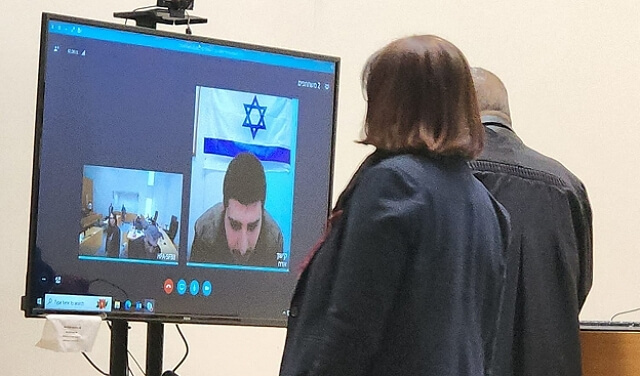
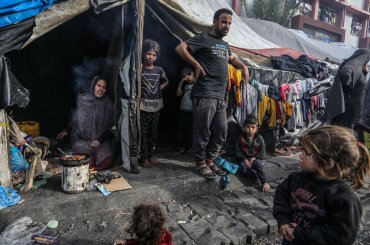

Political Prisoners in Israel/Palestine
115 Israelis are possibly being held prisoner by Palestinians, while 7360 are currently imprisoned by Israel.
https://ifamericansknew.org/stat/prisoners.html
‘A film which has been produced by a group of Australian journalists has sparked an international outcry against Israel after it explicitly detailed Tel Aviv’s use of torture against Palestinian children.
The film, titled ‘Stone Cold Justice’ documents how Palestinian children, who have been arrested and detained by Israeli forces, are subjected to physical abuse, torture and forced into false confessions and pushed into gathering intelligence on Palestinian activists.
Australia’s foreign minister Julie Bishop has spoken out against Israeli’s use of torture stating that “I am deeply concerned by allegations of the mistreatment of Palestinian children,” Israel’s Foreign Ministry spokesman Yigal Palmor has described the human rights abuses documented in the film as “intolerable”.’
https://www.youtube.com/watch?v=cvOSv2fGJ5w